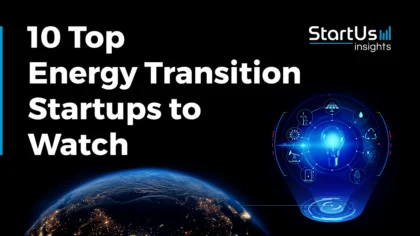Accelerate Productivity in 2025
Reignite Growth Despite the Global Slowdown
Staying ahead of the technology curve means strengthening your competitive advantage. That is why we give you data-driven innovation insights into the energy industry. This time, you get to discover 5 hand-picked startups developing organic solar cells (OSC).
Out of 71, the Global Startup Heat Map highlights 5 Top Startups developing Organic Solar Cells
The insights of this data-driven analysis are derived from the Big Data & Artificial Intelligence-powered StartUs Insights Discovery Platform, covering 2 093 000+ startups & scaleups globally. The platform gives you an exhaustive overview of emerging technologies & relevant startups within a specific field in just a few clicks.
The Global Startup Heat Map below reveals the distribution of the 71 exemplary startups & scaleups we analyzed for this research. Further, it highlights 5 energy startups that we hand-picked based on criteria such as founding year, location, funding raised, and more. You get to explore the solutions of these 5 startups & scaleups in this report. For insights on the other 66 organic solar cell solutions, get in touch.
Brilliant Matters designs Organic Photovoltaic (OPV) Materials
Organic solar cells utilize different chemicals for the creation of the absorption layer. These configurations of interlayers display high light absorption properties, for example, bulk heterojunctions (BHJ) that utilize thin layers of electrode material. Depending on the particular application, different conditions require different interlayer compositions. Thus, startups develop chemicals that address specific OSC needs. As a result, there is a reduction in reliance on fossil fuels by energy customers.
Canadian startup Brilliant Matters engineers materials for OPVs. The startup offers a wide range of different chemicals that form OPVs. For example, PCP-Na is a polymer interlayer material with anionic pendant groups and a conjugated backbone. It is hole selective and modifies the work function of the anode in an organic photovoltaic cell. This improves charge collection at the interface layer due to the higher work function of the material. Manufacturers of OSCs use the startup’s material solutions to optimize the efficiency of solar cells.
Epishine delivers OPVs for Commercial & Residential Appliances
The production, as well as the disposal, of photovoltaics, has a significant carbon footprint. For example, disposal of silicon-based PV cells requires demanufacturing, processing, and harvesting to extract the silicon. On the other hand, OSCs are eco-friendly. Thus, startups develop appliances that utilize organic solar cells to prevent environmental damage and promote sustainability.
Swedish startup Epishine provides OPVs to power various appliances. The startup’s manufacturing process with OSC allows for scalability. The electronics are usable in low-light conditions, with high-performance efficiency. These solar cells power the internet of things (IoT) devices such as temperature and humidity sensors, lighting control, and electronic locks. The wireless sensors run on indoor or outdoor lights and provide status updates to users. Thus, building owners and businesses gain the ability to rely on renewable power through recyclable OSCs.
Flask develops Flexible OSC
Due to the chemical composition of typical solar cells, these are not lightweight, mobile, or flexible. This rigidity arises from the chemicals used in the absorption layer. As a result, there are fewer application areas for the production and utilization of solar energy. To promote renewable energy, startups develop flexible OSCs. Due to the lightweight and flexible nature of the absorption layer, these cells increase the adoption of solar energy.
Japanese startup Flask designs flexible OSCs. The startup’s organic thin-film solar cells provide efficiencies at par with inorganic solar cells. Additionally, with these OSCs, it is possible to control the wavelength of light absorbed. The customization allows for transparent solar cells that transmit visible light and solar cells that show flexible colors. The startup’s solar panels replace windows, instead of converting them into a conduit for energy generation. Thus, residential and commercial buildings gain the benefits of solar energy from these window solar panels.
Savvy Science offers Printed OSC
From extraction to the purification of silicon, producing solar cells is process-heavy and requires a lot of space. This translates to higher costs and also limits the development of solar-based applications. OPVs, on the other hand, are simpler to build and allow manufacturers to reduce time and costs. Because of this, startups develop printed OSCs to promote their adoption at scale
British startup Savvy Science provides users with printed OSCs. The startup develops a sustainable semiconductor platform to maximize the environmental benefits of semiconductor technology. The startup utilizes sheet-to-sheet (S2S) and roll-to-roll (R2R) techniques to print OPV. The manufacturing of these devices promotes sustainability and is also recyclable. Additionally, the printing processes require minimal material resources and enhance energy efficiency. Thus, the startup’s devices provide individuals with environmentally-friendly options for utilizing solar energy. The startup also develops PeroLED, a sustainable semiconductor innovation project.
SunCurtain develops OPV-based Shading Solutions
The versatility of using solar technology depends on the physical properties of solar cells. For example, windows and reflective surfaces receive high levels of sunlight every day. However, due to the opaque nature of existing solar panels, they are unfeasible to use as window shades. OPVs are transparent due to the physical properties of the organic intermediary layer. Thus, startups develop solutions that allow users to produce solar energy from window shades and reflective surfaces.
German startup SunCurtain develops OPV-based window shades. The solution turns curtains into power generation sources. The startup provides a louvered curtain, with slates consisting of flexible, semi-transparent photovoltaic elements. The semi-transparency lets in enough light for a room, eliminating the need for artificial lighting. Additionally, the energy from the curtains supplies energy to the building’s energy supply.
Discover more Energy Startups
Energy startups such as the examples highlighted in this report focus on thin-film solar cells, community solar, and residential fuel cells. While all of these technologies play a major role in advancing the energy industry, they only represent the tip of the iceberg. To explore more energy technologies, simply get in touch to let us look into your areas of interest. For a more general overview, you can download our free Energy Innovation Report to save your time and improve strategic decision-making.








